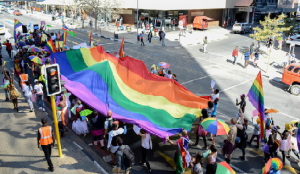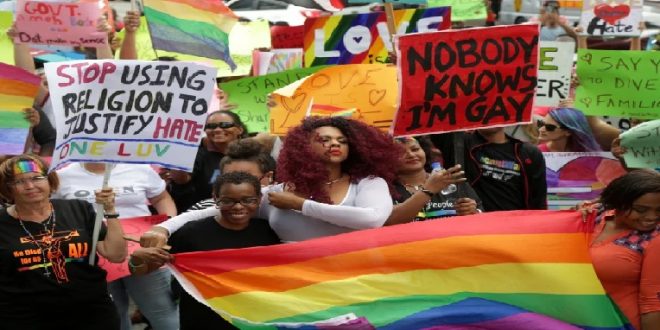22-06-2024
WINDHOEK: In a landmark ruling for gay rights campaigners, laws banning same-sex acts between men have been ruled unconstitutional in Namibia.
Convictions for the colonial-era offences of “sodomy” and “unnatural sexual offences” were rare but fueled discrimination against gay men who lived in fear of arrest.
 No laws exist prohibiting sex between women in Namibia.
No laws exist prohibiting sex between women in Namibia.
Marrying someone of the same sex is still illegal in the southern African nation.
But if a same-sex couple weds abroad and one of them is not a Namibian citizen, their union is legally recognized.
After Friday’s judgement was read out at a high court in the capital, Windhoek, campaigners for the LGBTQ group Equal Namibia shared photos of people hugging in court.
“Welcome to a new Namibia. A born-free Namibia,” the group said on social media.
The term “born-free” was most famously used in neighboring South Africa to describe the first generation of children growing up in the dawn of democracy after white-minority rule ended in 1994.
Western Australia
Sharing Malaysian culture in Western Australia
‘I no longer feel like a criminal’
This court case was brought by a Namibian activist called Friedel Dausab, with backing from the British charity Human Dignity Trust.
“It won’t be a crime to love anymore,” Dausab said, reacting to the verdict. “I no longer feel like a criminal on the run in my own country simply because of who I am.”
Summing up his emotions, he told the Reuters news agency he was “just happy”.
 The UN has also applauded the ruling, calling it a “powerful step” towards a more inclusive nation that would also improve access to health services and HIV treatment.
The UN has also applauded the ruling, calling it a “powerful step” towards a more inclusive nation that would also improve access to health services and HIV treatment.
Fearing a backlash to the ruling, the rights group Amnesty International is urging the Namibian government to ensure the safety and dignity of LGBTQ people.
It said it had already documented instances of “alarming” and “threatening” speech in the country during the run-up to the court case.
Namibia, first colonized by Germany, gained independence from South Africa in 1990 after a protracted war.
Several nations in Africa have repealed anti-LGBTQ laws in recent years, but South Africa is the only country where same-sex couples can marry and adopt.
Amnesty International said it documented “alarming rhetoric” in the run-up to the ruling “threatening the rights of LGBTI persons”.
“The authorities must ensure the safety of LGBTI persons in Namibia and hold accountable anyone who violates their rights,” said Khanyo Farise, the group’s deputy regional director for east and southern Africa.
While a handful of African countries have legalized same-sex relationships, South Africa remains the sole African nation which allows gay marriage, legalized in 2006.
Legal efforts to improve LGBTQ rights have drawn protests also in neighboring Botswana and Malawi over the past year.
In Namibia, the high court has jurisdiction over constitutional matters. Its decisions can be appealed before the Supreme Court.
The United Nations AIDS program, UNAIDS, said the latest judgment marked a “significant victory for equality and human rights”.
“This decision… is a powerful step towards a more inclusive Namibia,” said Anne Githuku-Shongwe, UNAIDS regional director for East and Southern Africa. (Int’l News Desk)
 Pressmediaofindia
Pressmediaofindia




